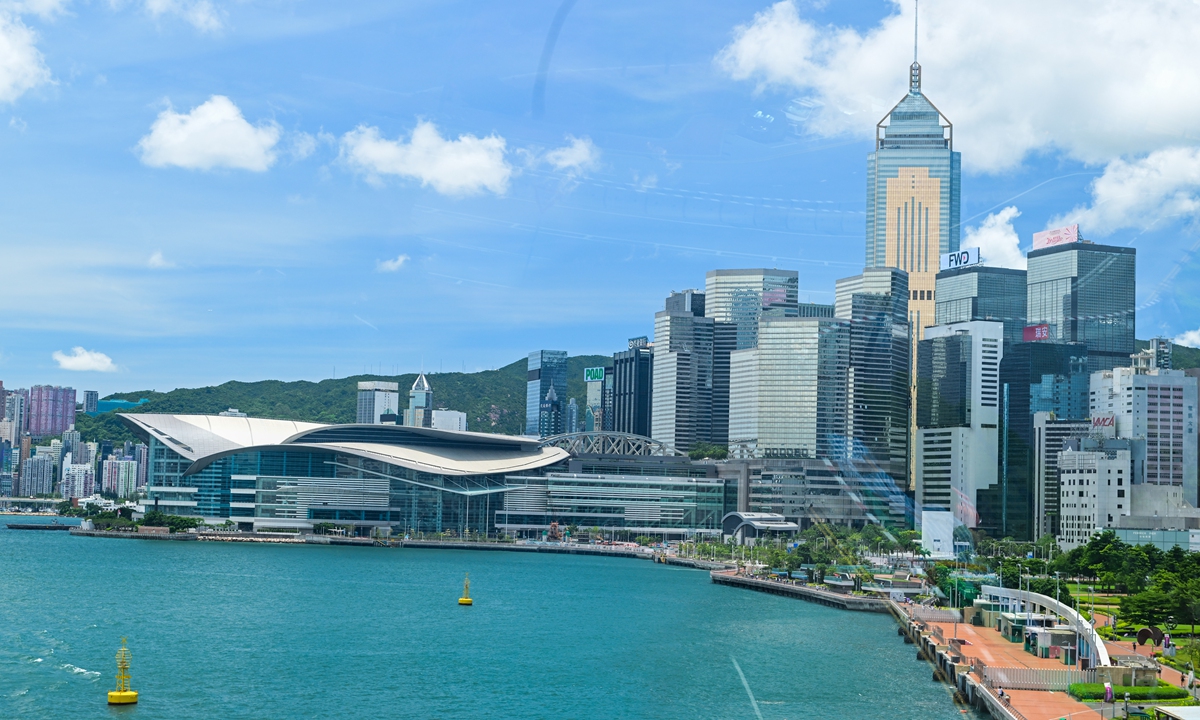A view of Victoria Harbor, Hong Kong Photo: VCG
Hong Kong’s financial markets have delivered a stellar performance so far this year, with the city topping the world in IPO fundraising, Financial Secretary of Hong Kong Special Administrative Region (HKSAR) Paul Chan Mo-po said on Sunday, pledging more efforts to achieve higher-quality and more diversified growth in the financial sector.
Since the start of 2025, IPO fundraising in Hing Kong has reached nearly HK$150 billion ($19.2 billion), the highest globally, with long-term international capital showing stronger participation, Chan noted in a blog post.
Meanwhile, market sentiment has been buoyant, with the Hang Seng Index surging more than 30 percent year-to-date. Trading has also hit record highs, with average daily turnover exceeding HK$250 billion, according to Chan.
In the first eight months of this year, refinancing by listed companies was nearly three times the amount raised through IPOs, which the financial secretary said highlights the depth and dynamism of Hong Kong’s capital markets.
These trends underscore Hong Kong’s strong positioning amid the technology-driven restructuring of the global financial landscape, as steadfast national support and concerted efforts by both the HKSAR government and financial sector are reinforcing its stature as a global financial hub, according to the blog.
On Thursday, the People’s Bank of China, the central bank, announced new measures to enhance financial connectivity between the Chinese mainland and Hong Kong, including permitting various types of offshore investors to conduct repurchase transactions in the mainland bond market and more than doubling the daily quota for northbound trading to 45 billion yuan.
In recent years, Hong Kong has steadily expanded financial opening-up, with a series of liberalization measures paving the way for foreign capital inflows, Song Ding, a research fellow at the China Development Institute, told the Global Times on Sunday.
Song also said that the central government’s favorable policies are backing the prosperity of Hong Kong’s stock market and financial market. “The US Federal Reserve’s recent rate cut and expectations of further easing are expected to drive more capital into Hong Kong, where growth potential is seen as stronger,” Song added.
The latest Global Financial Centers Index showed that Hong Kong further narrowed its gap with New York and London, maintaining its position as the world’s third-ranked financial hub and the top in Asia-Pacific. Also, the HKSAR ranked first globally in “financial technology,” “business environment,” “infrastructure,” and “reputation and overall,” reflecting its growing international recognition.
Hong Kong’s integration with technology innovation in the Guangdong-Hong Kong-Macao Greater Bay Area gives it enormous growth potential in fintech, Song said, adding that regional collaboration will fuel long-term vitality for innovation and high-quality financial development.
The buoyant IPO market, growing capital inflows and robust trading in Hong Kong have also boosted the performance of mainland A-shares, Chan noted in the blog.
According to Hong Kong Exchanges and Clearing, since September last year, 14 H-share companies listed in Hong Kong saw their corresponding A-share daily turnover in the mainland rise by an average of 28 percent, while their A-share prices climbed by 15 percent on average, according to the blog.
“More mainland enterprises with global ambitions choosing to list in Hong Kong will not only accelerate their global expansion, boost their revenue and raise their global visibility, but also create stronger mutual benefits between the two markets,” Chan said.
Amid global uncertainties, Chan stressed the need to build sustainable drivers for Hong Kong’s financial sector to achieve higher-quality and more diversified development, to contribute to the country’s broader goal of becoming a financial powerhouse.
On diversification, Chan said that Hong Kong is working to consolidate traditional strengths, while at the same time developing emerging segments such as fixed income, money markets, commodities and digital assets into new pillars of growth.
Hong Kong has established itself as Asia’s leading international bond issuance hub, with nearly 30 percent of Asia’s total international bonds arranged through the city. Its green and sustainable bond issuance accounted for about 45 percent of the regional total, Chan’s blog post said.
